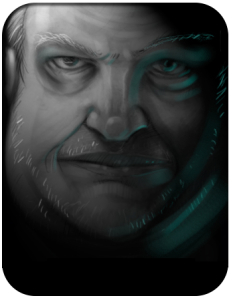DETECTIVE MOXLEY, Part 6: “You Really Don’t”
 “You’re going to have a heart attack,” said Chanelle from her doorway.
“You’re going to have a heart attack,” said Chanelle from her doorway.
“Nice to see you too, Chanelle,” said Moxley. He was florid, though relatively few stairs separated the ground level from his walk-up office. “I’ll have the rent soon.”
“You’re ten days late,” she said. Her tone was flat. That was what Moxley liked about Chanelle. She was utterly indifferent. To everything.
“I’ve got a case,” he told her, shuffling down the hallway. “They’ll pay as soon as I close it.”
Chanelle closed her door without comment. Huffing, Moxley rounded the corner and stopped before the entrance to his office. As he had suspected, the concealment panel above his doorway had been perforated, which meant the nailer concealed within had expended its rack of flechettes. The wall opposite his door bore several nails but very little blood. He was pleasantly surprised. He had stopped at the robot bodega at the other end of Dragon Street to get a bottle of blood spray and some plaster paste. He could probably save the spray for the next time someone tried to jimmy his lock.
He would need to pry the nails from the wall and check them for DNA when he could afford to pay for the trace. It was why he used the nailer. The flechettes were good for picking up evidence on the way through the target. Patching the plaster would prevent further antagonizing Chenelle, who — despite her lack of interest in his comings and goings — would eventually squeeze him for the overdue rent.
Moxley had warned Chanelle about the security system when he installed it. Rough as the neighborhood was, she could probably do with something similar. So far, she hadn’t bothered to get one, although she did own a misanthropic Chow. The massive dog hated everyone. Worse, the animal was utterly silent unless someone other than Chanelle walked across the threshold of her apartment. In the time Moxley had lived here, the dog had maimed three different intruders, killing one of them.
Mox typed his code into the keypad above the doorknob, waited, then kicked the sash to open the door. It stuck worse on rainy days. Thankfully, today had been dry.
Every one of Moxley’s worldly possessions waited for him in the office. His desk was positioned against a metal-frame bed. Next to his work terminal was a bench grinder. Opposite this was a bench bearing a variety of hand tools. Every wall boasted a mismatched shelf full of antique paper books and bound plastics — Moxley’s eclectic reference library, most of which was irreplaceable. A footlocker at the end of the bed contained those items he deemed worthy of extra security. These included his guns, his knives, and his Hongkongtown credentials, the latter stowed in a fireproof insulator.
The blinds over the windows were drawn. The only gap in the sun shields was for Moxley’s air-circ and cooling units. These were a necessity during Hongkongtown’s summers. Any wall space not taken by the windows was devoted to framed photographs and certifications, some of which were quite inexplicable. Moxley’s private detective license, certifications from hand-to-hand and weapons courses, his college degree, and several old photos of him with various politicians vied for space with lacquered, mounted fish, wood-cuts of Triad sigils, a painted shield bearing Indonesian blade patterns, and an impressive collage of pub and whiskey-bar coasters. Notably absent was any memento from the Border Wars, although Moxley had a box of threedies and photos from the conflict in storage.
The remaining floor space of the office was stacked high with suitcases, storage bins, a battered retail clothing rack that Moxley used for his coat and hat, his all-in-one printer-cooler-warmer, an industrial coffeemaker that didn’t work (but which served to support a commercial coffeemaker that did), and a dresser that held the rest of his clothes.
Moxley’s office chair creaked as he dropped gratefully into it. He was still breathing hard from the walk up the stairs. On the desk before him, take-out cartons, wrappers, stacks of data chips, and several tab computers were stacked with obsessive care. The only thing on the desk that was not work-related was a threedy of his son, Connor, and his ex-wife, Judith. Connor smiled sweetly at the camera. The image was an old one, taken when the boy was much younger. Judith looked like she had just swallowed a bug.
His eyes fell on the section of blackened carpet near one window. He had meant to patch that. Fortunately, the small fire that had scorched the carpet had not burned down the rest of the office. He had not had the heart to tell Chanelle about the damage. He also had very carefully avoided any mention of the rocket launcher whose back-blast had done the deed.
Sitting down, Moxley realized how tired he felt. He tempted fate by leaning way back in his old chair. Its spring-loaded suspension groaned beneath him. Sighing, crossing his hands over his stomach, Mox closed his eyes…
* * *
“Sergeant Moxley? Sergeant Harold Moxley?”
Mox looked up from the counter. It was that in name only; the entire supply depot was improvised, from the plank-and-keg counter to the cut-down shipping crates he was using for bins. The wireless network was down and going to stay that way for a while, so Mox had taken to keeping records by hand on a cracked clipboard from the motorpool. For receipts, he was using the back of truck-and-jeep sign-out slips. Finding a pen had been no small feat. He was a little worried about what he might do when this one ran out of ink.
“Major,” said Moxley, saluting less crisply than the Major would probably have liked. “If you’ve come for a requisition, sir, I’m going to have to stop you. We’re completely jerry-rigged since the offensive. I’m still trying to get a handle on what our resources truly are, and I’ve had to draft Meekins and Hainey from the Commander’s support pool as it is.”
“That’s not why I’m here, Sergeant,” said the Major. His words fell heavily, bringing Mox up short. He looked at the Major more closely and could read the tension in the man’s face.
“Sir?”
The Major — his battle blouse read IGLESIAS in block letters — took a pocket tab from his belt, swiped it, and passed it across the plank to Moxley. The recording that played was an aerial shot from one of the grenade drones. It showed Harold Moxley, assault rifle in hand, shooting down a group of Conks near the electric perimeter.
Moxley could feel his face growing hot. He looked up at Iglesias. “I don’t understand, Major,” he said.
“I think you do,” said Iglesias. “I think you should come with me, Sergeant.”
“Are you arresting me?” asked Moxley.
“No,” said Iglesias. “Not unless you refuse. Your call.”
Mox looked around, hoping he didn’t appear as helpless as he felt. “I can’t just pick up and leave,” he said. “I gotta find somebody to fill in for me here.”
“No, Sergeant,” said Major Iglesias. “You really don’t.”
* * *
Moxley opened his eyes and nearly fell out of his chair. His phone was vibrating in his pocket. He managed to get the disk to his face and say, “Yeah?” before the transmission stopped.
“Harold Moxley?” It was a woman’s voice. She sounded attractive. Mox did not recognize the ID, which was a numerical code and an address in an upscale Hongkongtown neighborhood.
“Yeah,” said Mox again.
“This is Deborah Rentner-Nile at the Brellwood School for Boys. I’m calling about Connor Moxley.”
Moxley could feel his jaw falling open. He closed it. “You…” he started. “You can’t be calling me here. How did you get this number? The kid’s got emergency contact information on file. You’re supposed to be calling his mother. I’m not… I’m not the guy you talk to. I can’t.”
“I apologize for the inconvenience, Mister Moxley,” said the woman. “It’s just that Connor indicates his mother is on vacation in Bermados and quite out of reach. We can’t seem to get the staff at his home, either. He says his stepfather is also not available. His attendant is quite unfortunately attending a funeral due to a death in the family. You’re all that’s left, I’m afraid.”
“Left for what?” Moxley asked. “What’s this about?”
“I hate to be the one to say this,” said the woman. He could picture her wringing her hands. She’d be a fidgeter. He would put money on it. “We regret to inform you that we are considering phoning the authorities.”
“The what now?” Moxley said. “What’s this all about?”
“Your son has been in a fight,” she said, careful to make her horror obvious. “We’ll need someone to come pick him up right away.”
Moxley sighed. He knew he was going to catch hell for this, but the only other option was to leave Connor to his fate.
“I’ll be right there,” said Mox.

